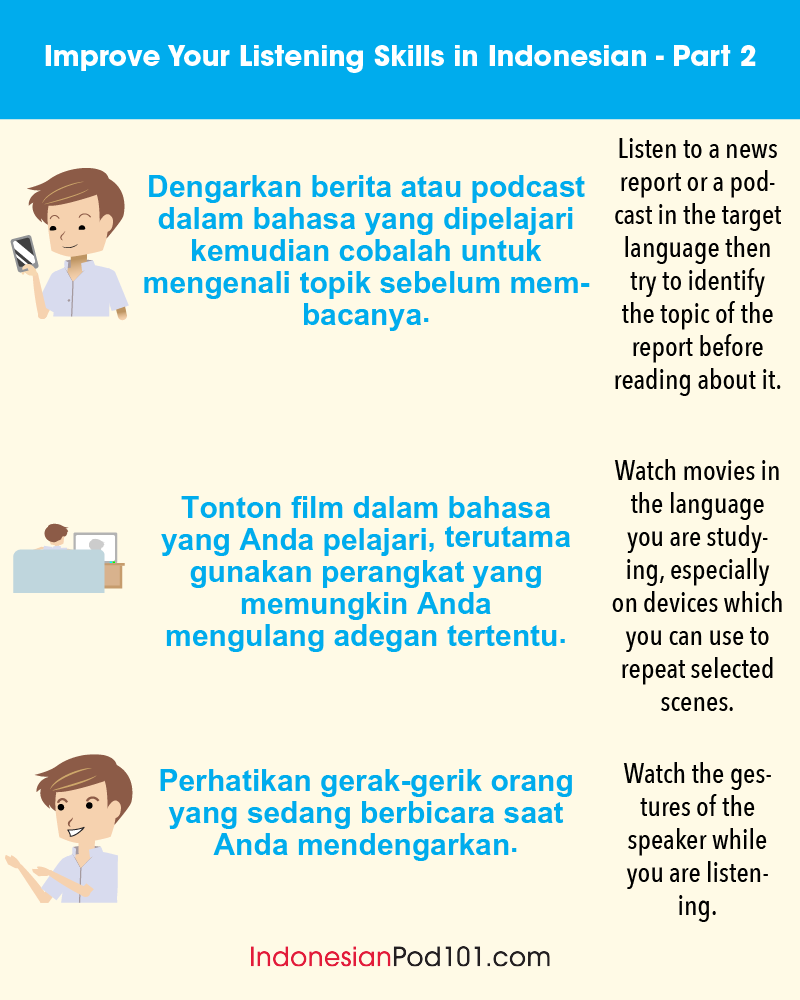Many Indonesian learners who study Indonesian on their own forget—or rather, never learn—a certain conjunction despite its importance. Conjunctions in Indonesian (or any language, really) aren’t usually a topic of interest to many learners.
Usually, they become accustomed to using alternate phrasings without having to take advantage of a conjunction. In fact, I’ve personally noticed that I tend to use one particular structure in all the foreign languages I study.
But when writing a formal letter or trying to contact a local university in Indonesia, you’ll always have to go as fluff-free in your writing as possible—which is something you can’t fully accomplish without the use of conjunctions.
It just goes to show that if you skip out on learning Indonesian conjunctions, you’re setting yourself up for a surprise moment of panic in the future!
Table of Contents
- What is a Conjunction?
- Similar Thoughts (And; Or)
- Cause and Effect (Because)
- Contrasts (But)
- Conditions (If)
- Consequence (So; Therefore)
- Purpose (In order to; That)
- Correlation (Not only, but also)
- One More Correlation (Both)
- How IndonesianPod101 Can Help You Master Indonesian Grammar
1. What is a Conjunction?
A conjunction, as you may already know, connects two things in discourse. That’s kind of abstract, but we use them constantly in any language. They’re some of the most common words.
If we take two ideas like “he jumped” and “he fell,” we can use the conjunction “and” in English to say “He jumped and fell.” Or we can contrast two states with “but,” such as in “I want it, but I don’t have it.”
Interestingly enough, you can’t say that one particular concept is a conjunction in every single language. Different words are used for different parts of speech across languages.
And there are a number of Indonesian conjunction words that are only used in formal speech. But once you start breaking down some of them, the rest follow similar and logical patterns. In this article, you’ll learn all the basics you need to know about the conjunction in Indonesian and how it works. So let’s get started!
2. Similar Thoughts (And; Or)
Let’s begin with the most basic of all, the concept of “and.” This word is dan in Indonesian. It works for verbs:
- Setiap hari saya menyapu dan mengepel lantai.
“Every day, I sweep and mop the floor.”
And it works for nouns.
- Ia punya sebuah gitar dan sebuah ukulele.
“He has a guitar and a ukulele.”
The word atau, meaning “or,” works very similarly as it does in English as well.
- Saya mau minum es jeruk atau es lemon teh.
“I want to drink orange juice or iced lemon tea.”
Unlike in English, it’s not considered acceptable in formal Indonesian writing to begin a sentence with Dan.
3. Cause and Effect (Because)
Another useful construction to have in your arsenal is to be able to say why something is a certain way. That explanation requires the word karena, meaning “because.”
The best part is, it works precisely like its English equivalent. If you can make a sentence with “because,” you can do it in Indonesian too with karena.
- Aku tidak suka bubur karena hambar.
“I don’t like congee because it’s bland.” - Karena dia orang istimewa, dia punya satpam pribadi.
“Because she’s an important person, she has private security.”
In that first example, we did see a slight difference with Indonesian: that you don’t need any linking word between “because” and an adjective. A slacker’s favorite excuse: karena malas or “because [I was] lazy!”
4. Contrasts (But)
The word for “but” has three forms, but they all work almost exactly the same way. Check this out:
- Dia mau tidur, tapi tidak bisa.
“She wants to sleep, but (she) can’t.”
We can lengthen tapi into tetapi, and in fact, we should if we’re going to use the language in a formal way. We can even turn it into two words:
- Saya mau pergi, akan tetapi motor saya rusak.
“I want to go, but my motorcycle is broken.”
This akan tetapi usage simply adds the meaning of “unfortunately” to your sentence. So it wouldn’t work to use it in a phrase like “I thought I won twenty dollars, but I actually won a hundred dollars!” Use the other two choices for that, and congratulations!
5. Conditions (If)
Now let’s give you the advantage I didn’t have.
Indonesian has two ways to express “if,” and those are jika and kalau.
- Jika dia tidak sampai, kita tidak bisa mulai.
“If she doesn’t arrive, we can’t begin.”
We could swap out kalau here and it would have the same meaning. So what’s the difference? Well, you can also use kalau as a way to say “As for X…” You can’t do this with jika and keep the same meaning.
- Kalau Adi, kami tidak mau berbicara dengannya.
“As for Adi, we don’t want to talk with him.”
Again, there’s a slight difference in formality here, where jika is the more formal/more often written of the two.
Jika can also be paired with the word maka to make an if/then statement. Kalau can’t.
- Jika ada kesempatan maka saya akan bicara dengannya.
“If there’s an opportunity, I’ll talk with them.”
6. Consequence (So; Therefore)
Let’s mention if and then a little bit more here. As we’ve seen, we can have “if” (kalau) without any “then” (maka). What about the other way around?
For that, we’ll need the word jadi which means “so.”
- Saya sampai lebih awal, jadi saya tidak stres.
“I arrived early, so I wasn’t stressed.”
We can use another word, sehingga, with this same meaning and a little bit of formality. But here’s where things start to get a little bit further away from English.
The word sehingga can also mean “as a result” or “to the extent that…”
- Mohon untuk menyapu lantai sehingga bersih.
“Please sweep the floor until it’s clean (so that it becomes clean).” - Dia makan ayam goreng setiap hari sehingga gemuk.
“He eats fried chicken every day until he’s fat (to the extent that he becomes fat).”
7. Purpose (In order to; That)
And that meaning sort of overlaps with our next category of “in order to.” The most common word here in Indonesian is untuk, which we’ve actually seen already in this article in the set phrase mohon untuk, or “please.”
- Saya sedang belajar bahasa Spanyol untuk mencari kerja di Meksiko.
“I’m studying Spanish in order to look for work in Mexico.”
However, the word untuk can also simply mean “for” in the sense of designating a recipient of an action, such as when giving a gift.
- Bunga-bunga ini untuk Anda.
“These flowers are for you.”
Have a look at a new couple of words here, kepada and bahwa.
Kepada can change freely with untuk in its second sense, designating the recipient of some action.
- Aku sudah minta maaf kepada bos.
“I already apologized to the boss.”
Bahwa is slightly more removed from English. It’s similar to the word “that” when you’re adding extra information to something. If you learn it in this particular context, it’s easy to keep in your mind:
- Dia memberitahu saya bahwa dia tidak akan lulus.
“He told me that he wouldn’t be able to graduate.”
Non-native speakers of English should find this a welcome relief. In English, you have to change the verbs to past tense to report what someone said, but this one little conjunction is all you need in Indonesian!
8. Correlation (Not only, but also)
Fortunately, the “not only, but also” conjunction set works great when we translate it directly into Indonesian. Have a look:
- Bukan hanya Denny tapi juga Rere tiba terlambat.
“Not only Denny, but also Rere, arrived late.”
The word juga means “also” in a broad sense, and can be used with nouns and verbs.
- Saya juga mau bicara dengan manajernya.
“I also want to talk to the manager.”
Where English limits you from using “also” at the end of a sentence, there’s no problem with doing so in Indonesian.
- Saya mau makan dan tidur juga.
“I want to eat and sleep as well.”
9. One More Correlation (Both)
For our last section, let’s look at the rather intricate ways that Indonesian can express the concept of “both.”
First, the way closest to English uses the word kedua-duanya, literally “the two of them.”
- Mereka kedua-duanya suka coklat.
“They both (the two of them) like chocolate.”
But that’s not really a conjunction because we’re not connecting two sentences or clauses. For that, we’ll up the ante and use the two-parter baik…maupun.
It works the same as the English phrase “both…and”:
- Baik Ina maupun Palak suka menonton film horor.
“Both Ina and Palak like to watch horror movies.”
This construction is stricter than in English, in that you’re limited to naming the subjects of different clauses. So that means you can’t take a sentence like “He likes both basketball and football,” and translate it with baik…maupun. You’ll need to use tidak hanya… tapi juga in that case.
- Dia tidak hanya suka bola basket, tapi juga suka sepak bola.
“He doesn’t just like basketball; he likes football too.”
10. How IndonesianPod101 Can Help You Master Indonesian Grammar
Effectively using conjunctions in Indonesian can feel like a superpower, albeit a small one. Indonesian is said to be an easy language, but all that means is that you can rapidly learn how to build sentences.
With each of the conjunctions you’ve learned today, you can build dozens of sentences with each one.
Competency in a language isn’t always expressed by how precise your vocabulary is—it’s more about how you’re able to express your ideas with the words you have. If, for some reason, you’ve forgotten how to say “if,” that expression isn’t easy!
The more you listen to and read Indonesian in your daily life, the more naturally these conjunctions and their sentence patterns will come to you. It’s all about getting used to a language. And when you do, there will be no limit to what you’re capable of.
Let us know which of these conjunctions you feel ready to start using, and which ones you’re still struggling with. We’d love to hear from you!
Author: Yassir Sahnoun is a HubSpot certified content strategist, copywriter and polyglot who works with language learning companies. He helps companies attract sales using content strategy, copywriting, blogging, email marketing & more.



















